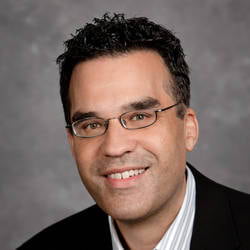Home Pages: PAW Business | PAW Financial | PAW Healthcare | PAW Industry 4.0 | PAW Climate | Deep Learning World
Agenda
Predictive Analytics World for Industry 4.0 2023
June 18-22, 2023 l Red Rock Casino Resort & Spa, Las Vegas
To view the full 7-track agenda for the five co-located conferences at Machine Learning Week click here or for the individual conference agendas here: PAW Business, PAW Financial, PAW Healthcare, PAW Industry 4.0 or Deep Learning World.
Session Levels:
Blue circle sessions are for All Levels
Red triangle sessions are Expert/Practitioner Level
Workshops - Sunday, June 18th, 2023
Full-day: 8:30am – 4:30pm PDT
Gain experience driving R for predictive modeling across real examples and data sets. Survey the pertinent modeling packages.
Sunday, June 18, 2023 – Red Rock Casino Resort & Spa, Las Vegas
Full-day: 8:30am – 4:30pm PDT
Intended Audience: People who want to use R to make predictions and discover valuable relationships in their data.
Knowledge Level: An introductory knowledge of R and machine learning is helpful, but not required.
Workshop Description
R offers a wide variety of machine learning (ML) functions, each of which works in a slightly different way. This one-day, hands-on workshop starts with ML basics and takes you step-by-step through increasingly complex modeling styles. This workshop makes ML modeling easier through the use of packages that standardize the way the various functions work. When finished, you should be able to use R to apply the most popular and effective machine learning models to make predictions and assess the likely accuracy of those predictions.
The instructor will guide attendees on hands-on execution with R, covering:
- A brief introduction to R’s tidyverse functions, including a comparison of the caret and parsnip packages
- Pre-processing data
- Selecting variables
- Partitioning data for model development and validation
- Setting model training controls
- Developing predictive models using naïve Bayes, classification and regression trees, random forests, gradient boosting machines, and neural networks (more, if time permits)
- Evaluating model effectiveness using measures of accuracy and visualization
- Interpreting what “black-box” models are doing internally
Hardware: Bring Your Own Laptop
Each workshop participant is required to bring their laptop
Schedule
- Workshop starts at 8:30am PDT
- AM Break from 10:00 – 10:15am PDT
- Lunch Break from 12:00am – 12:45pm PDT
- PM Break: 2:15 – 2:30pm PDT
- End of the Workshop: 4:30pm PDT
Instructor
Jared P. Lander, Chief Data Scientist, Lander Analytics
Jared P. Lander is Chief Data Scientist of Lander Analytics, the Organizer of the New York Open Statistical Programming Meetup and the New York and Government R Conferences, an Adjunct Professor at Columbia Business School, and a Visiting Lecturer at Princeton University. With a masters from Columbia University in statistics and a bachelors from Muhlenberg College in mathematics, he has experience in both academic research and industry. Jared oversees the long-term direction of the company and acts as Lead Data Scientist, researching the best strategy, models and algorithms for modern data needs. This is in addition to his client-facing consulting and training. He specializes in data management, multilevel models, machine learning, generalized linear models, data management, visualization and statistical computing. He is the author of R for Everyone (now in its second edition), a book about R Programming geared toward Data Scientists and Non-Statisticians alike. The book is available from Amazon, Barnes & Noble and InformIT. The material is drawn from the classes he teaches at Columbia and is incorporated into his corporate training. Very active in the data community, Jared is a frequent speaker at conferences, universities and meetups around the world.
Workshops - Monday, June 19th, 2023
Full-day: 8:30am – 4:30pm PDT
This one-day session surveys standard and advanced methods for predictive modeling (aka machine learning).
Monday, June 19, 2023 – Red Rock Casino Resort & Spa, Las Vegas
Full day: 8:30am – 4:30pm PDT
Intended Audience: Interested in the fundamentals of modern machine learning techniques.
Knowledge Level: For this introductory-level workshop, it is helpful for attendees to already be familiar with the basics of probability and coding.
Free Book! Each attendee will be reimbursed by the organizers for the cost of buying a copy of Dr Elder’s “Handbook of Statistical Analysis and Data Mining Applications 1st Edition” (up to $50, receipt required).
Companion Workshop: This workshop is the perfect complement for Dr. Elder’s other one-day PAW workshop, “The Deadly Dozen: The Top 12 Analytics Mistakes and the Techniques to Defeat Them,” although both workshops stand alone and may be taken in either order.
Workshop Description
This one-day session surveys standard and advanced methods for predictive modeling (aka machine learning).
Predictive analytics has proven capable of generating enormous returns across industries – but, with so many machine learning modeling methods, there are some tough questions that need answering:
- How do you pick the right one to deliver the greatest impact for your business, as applied over your data?
- What are the best practices along the way?
- How do you make it sure it works on new data?
In this workshop, renowned practitioner and hugely popular instructor Dr. John Elder will describe the key inner workings of leading machine learning algorithms, demonstrate their performance with business case studies, compare their merits, and show you how to select the method and tool best suited to each predictive analytics project.
Attendees will leave with an understanding of the most popular algorithms, including classical regression, decision trees, nearest neighbors, and neural networks, as well as breakthrough ensemble methods such as bagging, boosting, and random forests.
This workshop will also cover useful ways to visualize, select, reduce, and engineer features – such as principal components and projection pursuit. Most importantly, Dr. Elder reveals how the essential resampling techniques of cross-validation and bootstrapping make your models robust and reliable.
Throughout the workshop day, Dr. Elder will share his (often humorous) stories from real-world applications, highlighting mistakes to avoid.
If you’d like to become a practitioner of predictive analytics – or if you already are and would like to hone your knowledge across methods and best practices – this workshop is for you.
What you will learn:- The tremendous value of learning from data
- How to create valuable predictive models with machine learning for your business
- Best Practices, with real-world stories of what happens when things go wrong
Why Attend?
View Dr. Elder describing his course, “The Best of Predictive Analytics,” in this brief video:
Schedule
- Workshop starts at 8:30am PDT
- AM Break from 10:00 – 10:15am PDT
- Lunch Break from 12:00am – 12:45pm PDT
- PM Break: 2:15 – 2:30pm PDT
- End of the Workshop: 4:30pm PDT
Special offer: Register for both this workshop as well as Dr. Elder’s other one-day PAW workshop, “The Deadly Dozen: The Top 12 Analytics Mistakes and the Techniques to Defeat Them” (complementary but not required), and also receive his co-authored book Ensemble Methods in Data Mining: Improving Accuracy Through Combining Predictions.
Instructor
Dr. John Elder, Founder and Chair, Elder Research
John Elder leads America’s most experienced Data Science consultancy. Founded in 1995, Elder Research has offices in Virginia, Washington DC, Maryland, North Carolina, and London. Dr. Elder co-authored books on data mining, ensembles, and text mining — two of which won book-of-the-year awards. John was a discoverer of ensemble methods, chairs international conferences, and is a popular keynote speaker. Dr. Elder is an (occasional) Adjunct Professor of Engineering at UVA, and was named by President Bush to serve 5 years on a panel to guide technology for national security.
Full-day: 8:30am – 4:30pm PDT
Machine learning improves operations only when its predictive models are deployed, integrated and acted upon – that is, only when you operationalize it.
Monday, June 19, 2023 – Red Rock Casino Resort & Spa, Las Vegas
Full-day: 8:30am – 4:30pm PDT
Intended Audience: Managers, decision makers, practitioners, and professionals interested in a broad overview and introduction
Knowledge Level: All levels
Workshop Description
Machine learning improves operations only when its predictive models are deployed, integrated and acted upon – that is, only when you operationalizeit. To get to that point, your business must follow a gold standard project management process, one that is holistic across organizational functions and reaches well beyond executing the core number crunching itself.
At this workshop, you will gain a deep understanding of the concepts and methods involved in operationalizing machine learning to deliver business outcomes. This workshop focuses on the elements of a machine learning project that define and scope the business problem, ensure that the result is useful in business terms, and help deliver and operationalize the machine learning outcome. Based on CRISP-DM – the most well known, established industry standard management process for machine learning – this course does not dive into the core machine learning technology itself, but focuses instead on how machine learning must be applied in order to be effective. Attendees will have opportunity to apply what they learn to real-life scenarios.
Key Topics:
- Apply machine learning to business operations through the structure of CRISP-DM
- Use decision modeling to understand real-world business problems in a way that allows machine learning to be applied effectively
- Take a decision-centric and business-focused approach to machine learning projects
- Evaluate and deploy machine learning results to minimize the gap between analytic insight and business improvement
Coverage of the CRISP-DM Project Management Phases:
- An overview of CRISP-DM and its basic approach
- Discuss and demonstrate the importance of decisions in the Business Understanding phase
- Introduce and teach decision modeling as a way to assess the situation and set goals for the project
- Discuss decision-centric approach to Data Understanding phase of CRISP-DM
- Discuss decision-centric approach to Data Preparation and Modeling phase of CRISP-DM
- Discuss decision-centric approach to Evaluation phase of CRISP-DM
- Discuss decision-centric approach to Deployment phase of CRISP-DM
- Brief discussion of technical deployment options
- Specification of business rules in a decision model to turn predictive analytic into prescriptive one
- Importance of ongoing decision (not just model) monitoring and management
Learning Objectives:
- Frame data quality and other data needs in decision-centric terms
- Evaluate machine learning outputs against decision models to determine business value
- Use decision models to show how machine learning results can be captured and compared
- Understand different ways in which machine learning can be used to improve decision-making
- Read and understand a decision model built using the Decision Model and Notation (DMN) standard
- Develop basic decision modeling skills for use on machine learning projects
- Understand how decision modeling complements CRISP-DM as an approach to machine learning
- Understand technology architecture required for machine learning project deployment
- Be able to use decision model to frame organizational and process change requirements for machine learning project
- Understand use of business rules and business rules technology alongside machine learning
Schedule
- Workshop starts at 8:30am PDT
- AM Break from 10:00 – 10:15am PDT
- Lunch Break from 12:00am – 12:45pm PDT
- PM Break: 2:15 – 2:30pm PDT
- End of the Workshop: 4:30pm PDT
Instructor
James Taylor, CEO, Decision Management Solutions
James Taylor is the CEO of Decision Management Solutions and is a leading expert in how to use business rules and analytic technology to build decision management systems. He is passionate about using decision management systems to help companies improve decision-making and develop an agile, analytic and adaptive business. He provides strategic consulting to companies of all sizes, working with clients in all sectors to adopt decision-making technology. James is an expert member of the International Institute for Analytics and is the author of multiple books and articles on decision management, decision modeling, predictive analytics and business rules, and writes a regular blog at JT on EDM. James also delivers webinars, workshops and training. He is a regular keynote speaker at conferences around the world.
Full-day: 8:30am – 4:30pm PDT
This one-day introductory workshop dives deep. You will explore deep neural classification, LSTM time series analysis, convolutional image classification, advanced data clustering, bandit algorithms, and reinforcement learning.
Monday, June 19, 2023 – Red Rock Casino Resort & Spa, Las Vegas
Full day: 8:30am – 4:30pm
Important note: Each workshop participant is required to bring their own laptop.
Intended Audience: Anyone who wishes to learn how to create deep learning systems using PyTorch, TensorFlow, Keras, and other popular software libraries.
Knowledge Level: Basic knowledge of machine learning terminology. Minimal programming experience with a C-family language such as Python, C/C++, C# or Java is recommended but not required.
Workshop Description
This one-day introductory workshop dives deep. You will explore deep neural classification, LSTM time series analysis, convolutional image classification, advanced data clustering, bandit algorithms, and reinforcement learning. It’s a hands-on class; you’ll learn to implement and understand both deep neural networks as well as unsupervised techniques using PyTorch, TensorFlow, Keras, and Python. Just as importantly, you’ll learn exactly what types of problems are appropriate for deep learning techniques, and what types of problems are not well suited to deep learning.
The instructors, Prerna and Bardia, take part in applying cutting-edge Large Language Models and other custom models to address various industries’ needs. They will be sharing case studies and examples from their experience during the workshop. Workshop participants will access much of the same state-of-the-art training material used for this work at Microsoft. Along the way, James will cover case studies detailing large-scale deployments for their internal clients that have generated astounding ROIs.
During the day, workshop attendees will gain the following practical hands-on experience:
- How to prepare, normalize, and encode data for deep learning systems.
- How to install deep learning libraries including TensorFlow, Keras, and PyTorch, and the pros and cons of each library.
- How to create deep learning predictive systems for various kinds of data: classical business data, time series data (such as sales data), image data (such as the famous MNIST dataset for handwriting recognition), and text/document data (such as legal contracts). These datasets are a great place to start – however, for the more experienced attendee, even more challenging, “next level” datasets, such as for object recognition, will be optionally available.
This workshop assumes you have a basic knowledge of machine learning terminology but does not assume you are a machine learning expert. Some theory will be presented but only enough to help you understand how to make a practical, working deep learning system. This is a code-based workshop, so some programming experience will be helpful. However, beginners will be able to follow along but may have to work a bit harder to keep up.
Hardware: Bring Your Own Laptop
Important note: Each workshop participant is required to bring their own laptop.
You are encouraged to bring a Windows 10 or 11 laptop if you have one available, but a Mac laptop will work as well.
Details regarding laptop options as well as pre-install instructions for both platforms will be updated closer to the event, since the new, forthcoming PyTorch 2.0, coming out spring 2023, will be utilized — but for now, you can access last year’s details here.
Assistants will also be on hand to help attendees with hardware/software issues.
Attendees receive an electronic copy of the course materials and related code at the conclusion of the workshop.
Schedule
- Workshop starts at 8:30am
- Morning Coffee Break at 10:30am – 11:00am
- Lunch at 12:30pm – 1:15pm
- Afternoon Coffee Break at 3:00pm – 3:30pm
- End of the Workshop: 4:30pm
Instructors:
Bardia Beigi, Applied Scientist II, Microsoft
Bardia Beigi works at Microsoft as an Applied Scientist II in the Industry AI group delivering AI/ML based solutions to various industries within Azure. Bardia has a master’s degree in Computer Science from Stanford University, as well as Bachelor of Applied Science in Engineering Physics from the University of British Columbia. In his spare time, Bardia enjoys traveling, trying out new dessert spots, and learning new life hacks.
Prerna Singh, Applied Scientist II, Microsoft
Prerna Singh is currently working as an Applied Scientist II in the Industry AI group @Microsoft where she develops machine learning-based solutions for different industrial verticals including finance and sustainability. Before joining Microsoft, she obtained her master’s degree in Electrical and Computer Engineering with a concentration on Machine Learning from Carnegie Mellon University (CMU). Prerna is passionate about machine learning, NLP and deep Reinforcement Learning. Besides work, Prerna enjoys traveling, Zumba and hiking in her free time.
Predictive Analytics World for Industry 4.0 - Las Vegas - Day 1 - Tuesday, June 20th, 2023
Machine Learning Week Founder Eric Siegel will welcome you to the event and kick things off.
Join Kian Katanforoosh, CEO and Founder of Workera, as he explores the profound impact of generative AI on the workforce and the evolution of personalized learning. With his rich experience in AI education and having taught AI to over 4 million people with Prof. Andrew Ng as founding member of DeepLearning.AI, Kian's insights are uniquely informed and forward-thinking.
In this keynote, Kian will unravel how generative AI is reshaping learning, emphasizing the pivotal role of skills data in actualizing personalized learning. He will discuss the harnessing of this data to tailor learning experiences to individual needs, track progress, identify improvement areas, and improve workforce management.
Drawing from his experiences as a founding member of DeepLearning.AI and the co-creator of the popular Stanford Deep Learning Class, Kian will share his vision for a future where learning is as unique as we are. Attend this session for a deep dive into the convergence of AI, personalized learning, and workforce transformation.
Google continues to take a bold and responsible approach to developing and deploying AI through the company’s infrastructure, tools, products, and services. Google brought further AI breakthroughs into the real world through Google Cloud’s launch of the next wave of generative AI across core areas of their business, and new partnerships and programs grounded in Google’s commitment to an open AI ecosystem. At the same time, AI, as a still-emerging technology, poses complexities and risks; and the development and use of AI must address these risks in a structured, transparent, and accountable way. A robust governance structure – and rigorous testing and ethics reviews — is necessary to put responsible AI principles into practice. And with AI regulation coming soon, Jen will share learnings, challenges, and practical tips on how Google is maturing its responsible AI practices, processes, and tools in advance of greater regulatory, global standards, and consumer expectations.
In this session, Juan Acevedo, a machine learning architect at Google, will discuss how organizations can leverage Google Cloud's generative AI products to bring value to their businesses in a secure environment and responsibly. Juan will cover the following topics: What can you do right now with Google Cloud technology Responsible generative AI This session is for those who are interested in learning more about generative AI and how it can be used to improve their businesses.
Understanding how to evaluate the performance of a model is fundamental to the work of Decision Science professionals. Often, metrics used to evaluate model performance are deployed based on theory and that might not, necessarily, holistically explain the models applied benefit, or lack thereof, to the business. This session will evaluate the trade off between model performance metrics and making business impact. What is good enough?
IoT sensors are commonly used to monitor the environment inside shipping containers. Such monitoring provides valuable insights on the condition of cargo in real time. In many situations, however, guidance on preventive action (packaging, desiccant quantity etc.) is desired in the planning phase, i.e., before the first shipment has departed. In such situations, we can use the itinerary and weather data to model the climate inside the container. One key challenge in such modeling arises from unknowns. For example, an exposed container's climate is different from one stacked below others. Mapping weather + itinerary data to container climate is a representation learning problem, where the representation signifies the container's journey. Statistical characterization of container representations can inform the shipment planning process.
Machine learning (ML) is a rapidly growing field that opens a lot of opportunities for transformation workflows for many users. This presentation will introduce how to enhance user productivity using Machine Learning and replace repetitive manual actions with intellectual ML suggestions. This talk will cover the following:
- Developing a universal ML workflow to process any type of users data (image and text)
- Instrumentation and feedback collection that will help drive future improvements by using incremental learning techniques
- Best practices in applying ML for optimizing the user experience working with Autodesk product
As Industrial organizations adventure in their advance analytics and AI journey to gain more insights from their data, organizations need to evolve and mature in the way they can interact and leverage data. These organizations need to deploy individuals who can provide the vision for this journey and lead their organizations how navigate it.
This is where the Analytic Translator role is essential to an organization's success. They are the visionary and guide to create a path from being overwhelmed by ineffective data and metrics within undefined business processes to effectively "organizing information" to inform key business decisions. This talk will discuss the role of the Analytic Translator to enable the advance analytics and AI journey, what skills are needed, and how they can lead their organizations effectively to secure the desired competitive advantage.
At Northwestern we have developed a system that is built to consume and capitalize on IoT infrastructure by ingesting device data and employing modern machine learning approaches to infer the status of various components of the IoT system. It is built on several open source components with state-of-the-art artificial intelligence. We will discuss its distinguishing features of being Kubernetes native and by employing our work that enables features to be specified through a flexible logic which is propagated throughout the architectural components. We will discuss select use cases implemented in the platform and the underlying benefits. The audience will learn how to build or use a streaming solution based on Kubernetes and open source components.
Graph data structures provide a versatile and extensible data structure to represent arbitrary data. Data entities and their associated relations fit nicely into graph data structures. We will discuss GraphReduce, an abstraction layer for computing features over large graphs of data entities. This talk will outline the complexity of feature engineering from raw entity-level data, the reduction in complexity that comes with composable compute graphs, and an example of the working solution. We will also discuss a case study of the impact on a logistics & supply chain machine learning problem. If you work on large scale MLOps projects, this talk may be of interest.
How to Attract and Recruit Analytics Talent from Top Universities (especially if you're not a tech giant)Competition for top new analytics talent is fierce. While tech and other corporate giants are indeed vacuuming up new grads from top schools, not all great students can or want to go that route. The challenge is to put yourself in a position to attract and land them. It can be done, even if you're not a well-known brand. In this session, you will learn what works from a leader of the analytics program ranked #2 in the world by QS for the past three years. Even if you are from a giant firm, you're still competing for talent. You will come away with ideas to help you gain an advantage!
Predictive Analytics World for Industry 4.0 - Las Vegas - Day 2 - Wednesday, June 21st, 2023
Conference Chair Steven Ramirez will welcome you to day 2
Recent industry surveys have shown that up to 80% of ML models do not get deployed. There are roadblocks at every stage of the ML model development lifecycle. Is it possible we are going about this all wrong?
In this session, we will explore a series of case studies to drill down on the roadblocks to ML deployment. And along the way, identify the pieces you must have in place to improve your chances of deployment success.
This session will be interactive. If you’re ready to discuss your deployment challenges, you’ll be able to tap the wisdom of your peers.
Rexer Analytics began surveying data scientists in 2007. This year's Data Science Survey is a collaboration with "Predictive Analytics" author and conference series founder Eric Siegel. In this session, Dr. Rexer will present preliminary results from this year's survey. Topics will include algorithm choices, data science job satisfaction trends, deep learning, model deployment, and deployment challenges.
Within the Human Resources industry there are still many challenges ahead, for example, keyword-based searches or manual resume screening could contribute to omitting valuable opportunities or lengthy hiring procedures. For this reason, we would like to present a novel Recommendation System in the field of HR, which includes a series of Natural Language Processing techniques and Deep Learning models, that allow us to achieve a fully automated process that will propose semantically related and explainable suggestions to job seekers and companies in real-time. The system architecture combines several NLP techniques, such as named entity recognition, text classification, and entity relationships based on HR data, to extract and process more than 50 different characteristics of job postings and resumes, such as occupations, skills, education, etc., with various granularity levels and multiple languages.
We illustrate here a Living Digital Twin of a fleet of Electric Vehicles that gives actionable predictions of battery degradation over time. Since each vehicle takes a different route and has different charging and discharging cycles over its lifetime, the battery degradation for each vehicle will be different. We use a scalable predictive modeling framework deployed across a distributed computing architecture in the cloud to make individualized predictions for each EV battery in the fleet to reflect the degraded performance accurately. The neural network battery model is calibrated using the parameters that had the most significant impact on the output voltage through the Unscented Kalman Filter (UKF) method, which is a Bayesian technique for parameter estimation of non-linear system behavior. We simulated in-production real-world operations by having the vehicles “drive” the routes using synthetic datasets and showed how the calibrated model provide more accurate estimates of battery degradation. Using a Living Digital Twin to calculate the remaining range and battery State of Health addresses problems of range anxiety in the EV automotive industry and can drive the value of EVs in the market.
ML’s great strength is that example cases are all you need to create a predictive model. The predictions work as long as the underlying process is not tampered with. But clients usually seek more: they yearn to understand the "data-generating machinery” in order to improve the outcome that the model predicts. Yet, this is dangerous without additional external information, including the direction of influence between variables. This talk illustrates how to achieve “peak interpretability” by using influence diagrams to model causal relationships, avoid mistaking correlation for causation, and quantify how outcomes will change when we manipulate key values.
Industrial manufacturing has gained largely from artificial intelligence (AI). Particularly, generative design has leveraged cloud computing and AI to allow fine-grained control over manufacturing processes, loads, and constraints. On one hand, AI-powered solutions simulate complex geometries with customizable material properties. On the other, AI has enabled control over processes without compromising design safety and with significant material savings. Additionally, the foundation models in computer vision and natural language have opened the doors to limitless possibilities.
Delivering a product that needs to meet global high-quality standards requires controlled design and manufacture, navigating the often confusing logistical supply chain, and customer-driven time-to-market deadlines. According to Forbes, unplanned downtime costs industrial manufacturers $50 billion a year. As manufacturing companies scale AI initiatives, the struggle remains to align their operational needs with AI capabilities.
The heavy reliance on limited or siloed data can lead to severe compromises on accuracy and the value of insights driven by AI systems. Moreover, with the increasing complexity of the product and strict quality-control standards, fast-moving production companies lag behind in being able to explain AI models. This inhibits the visibility into patterns that can lead to potential problems or failures that result in unplanned outages and low production efficiency.
Join a session with Ayush Patel, Co-founder at Twelvefold as he takes you through the AI-enabled generative design landscape and its challenges. Explore key strategies to maintain scalable yet reliable AI solutions while achieving significant ROI from manufacturing operations.
Supply chains have been very lean for decades, and the challenges in the last few years have led more teams to focus on resiliency. With the quantity of data available across manufacturing, shipping, stocking, and inventory, teams can turn to analytics to improve the resiliency of supply chains. This talk will highlight how analytics has helped improve supplier reliability, decrease sourcing costs, and quantify the true risk of supply chain disruption.
Ask our “Rockstars” anything about predictive analytics! Curious about machine learning tips, tricks, best practices and more? This is your opportunity to hear advice directly from the experts. The hardest part of machine learning can be getting models deployed into production. Our panel has done it, and is willing to spill the tea on how to make it happen. You’ll want to stick around for this ultimate session of the conference.
Workshops - Thursday, June 22nd, 2023
Full-day: 8:30am – 4:30pm PDT
Python leads as a top machine learning solution – thanks largely to its extensive battery of powerful open source machine learning libraries. It’s also one of the most important, powerful programming languages in general.
Thursday, June 22, 2023 – Red Rock Casino Resort & Spa, Las Vegas
Full-day: 8:30am – 4:30pm PDT
Intended Audience: Practitioners who wish to learn how to execute on machine learning with Python.
Knowledge Level: Prior experience programming in any language (for machine learning or otherwise) and fundamental knowledge of machine learning concepts. This workshop can serve as your first experience executing on machine learning hands-on – or, if you already have such experience with a language or platform other than Python, this workshop will serve to facilitate your “lateral move” to Python.
Workshop Description
Python leads as a top machine learning solution – thanks largely to its extensive battery of powerful open source machine learning libraries. It’s also one of the most important, powerful programming languages in general. Python provides a great way for machine learning newcomers to begin their hands-on practice, or for experienced practitioners to augment their growing battery of tools.
Note regarding deep learning. Python’s popularity has recently grown even further since it is the most common way to access leading deep learning solutions such as TensorFlow. Note that this workshop day does not cover deep learning, since it serves first-time users by covering a broader, foundational range of traditional machine learning methods. However, this training does provide helpful groundwork for the “Hands-On Deep Learning in the Cloud” workshop scheduled for later in the same week.
During this full-day training workshop, instructor Clinton Brownley – a data scientist at WhatsApp and formerly Facebook, where he gained extensive experience leading internal machine learning trainings – will take you on your first steps with Python, guiding you through challenging hands-on exercises to employ various machine learning capabilities within Python and apply them on real world datasets.
A comprehensive training. The training agenda covers the end-to-end machine learning process, including loading and preprocessing data, building, tuning, and comparing classification and regression models, making predictions, and reporting on model performance.
Topics include:
- Data preprocessing
- Cross-validation
- Model tuning
- Model evaluation
- Regression
- Classification
- Ensemble methods
Diverse application areas. This workshop’s hands-on exercises cover various applications of predictive modeling that serve to mitigate harm and save money, including: gambling, hospital readmissions, nefarious actor detection, time to failure, and hotel bookings.
Bring your laptop with Python pre-installed. Workshop participants are required to bring their own laptops for use during this hands-on workshop with Python version ≥3.x installed. The primary libraries for the workshop are pandas, scikit-learn, and matplotlib, but specific examples may rely on other libraries, so participants should also install seaborn, pymc3, and jupyter.
Pre-install instructions. The easiest way to have both a compatible version of Python as well as all these required libraries on your laptop is to install the Anaconda Distribution of Python. Please be sure to do prior to the workshop day.Schedule
- Workshop starts at 8:30am PDT
- AM Break from 10:00 – 10:15am PDT
- Lunch Break from 12:00am – 12:45pm PDT
- PM Break: 2:15 – 2:30pm PDT
- End of the Workshop: 4:30pm PDT
Instructor
Clinton Brownley, Data Scientist, WhatsApp
Clinton Brownley, Ph.D., is a data scientist at WhatsApp, where he’s responsible for a variety of analytics projects designed to improve messaging and VoIP calling performance and reliability. Before WhatsApp, Clinton was a data scientist at Facebook, working on large-scale infrastructure analytics projects to inform hardware acquisition, maintenance, and data center operations decisions. As an avid student and teacher of modern analytics techniques, Clinton is the author of two books, “Foundations for Analytics with Python” and “Multi-objective Decision Analysis,” and also teaches Python programming and data science courses at Facebook and in the Bay Area. Clinton is a past-president of the San Francisco Bay Area Chapter of the American Statistical Association and is a council member for the Section on Practice of the Institute for Operations Research and the Management Sciences. Clinton received degrees from Carnegie Mellon University and American University.
Full-day: 8:30am – 4:30pm PDT
This one-day session reveals the subtle mistakes analytics practitioners often make when facing a new challenge (the “deadly dozen”), and clearly explains the advanced methods seasoned experts use to avoid those pitfalls and build accurate and reliable models.
Thursday, June 22, 2023 – Red Rock Casino Resort & Spa, Las Vegas
Full day: 8:30am – 4:30pm PDT
Intended Audience: Interested in advanced machine learning techniques.
Knowledge Level: For this intermediate-level workshop, it is helpful for attendees to already be familiar with the basics of machine learning methods.
Free Book! Each attendee will be reimbursed by the organizers for the cost of buying a copy of Dr Elder’s “Handbook of Statistical Analysis and Data Mining Applications 1st Edition” (up to $50, receipt required).
Companion Workshop: This workshop is the perfect complement for Dr. Elder’s other one-day PAW workshop, “The Best of Predictive Analytics: Core Machine Learning and Data Science Techniques,” although both workshops stand alone and may be taken in either order.
Workshop Description
This one-day session reveals the subtle mistakes analytics practitioners often make when facing a new challenge (the “deadly dozen”), and clearly explains the advanced methods seasoned experts use to avoid those pitfalls and build accurate and reliable models.
This workshop covers:
- Antidotes: the best practices that overcome the most common flawed practices
- Intuitive explanations of resampling methods that ensure your models work on new data
- Practical tips for both the hard and the soft skills that will see your project through to implementation
In this workshop, renowned practitioner and hugely popular instructor Dr. John Elder will survey the most advanced analytics tools in the practitioner’s toolkit, with particular emphasis on resampling tools – such as cross-validation and target shuffling (a method to avert p-hacking devised by Dr. Elder) – which reveal the true accuracy of your models.
Workshop topics also include visualization, feature engineering, global optimization, criteria of merit design, ensembles, and “soft” factors that affect success, such as human cognitive biases. Attendees will also leave with an understanding of the inner workings of the most popular algorithms – including regression, decision trees, nearest neighbors, neural networks, bagging, boosting, and random forests.
Throughout the workshop day, Dr. Elder will share his (often humorous) stories from real-world applications, illuminating the technical material covered.
If you’d like to become a more expert practitioner of predictive analytics, this workshop is for you.
What you will learn:
- The 12 subtle pitfalls to watch out for on any new project
- The latest ways to increase the value of predictive models and machine learning for your business
- How to succeed when your biggest threat is not technology, but people (e.g., resistance to change)
Why Attend?
View Dr. Elder describing his course, “The Deadly Dozen,” in this brief video:
Schedule
- Workshop starts at 8:30am PDT
- AM Break from 10:00 – 10:15am PDT
- Lunch Break from 12:00am – 12:45pm PDT
- PM Break: 2:15 – 2:30pm PDT
- End of the Workshop: 4:30pm PDT
Special offer: Register for both this workshop as well as Dr. Elder’s other one-day PAW workshop, “The Best of Predictive Analytics: Core Machine Learning and Data Science Techniques” (complementary but not required), and also receive his co-authored book Ensemble Methods in Data Mining: Improving Accuracy Through Combining Predictions.
Instructor
Dr. John Elder, Founder and Chair, Elder Research
John Elder leads America’s most experienced Data Science consultancy. Founded in 1995, Elder Research has offices in Virginia, Washington DC, Maryland, North Carolina, and London. Dr. Elder co-authored books on data mining, ensembles, and text mining — two of which won book-of-the-year awards. John was a discoverer of ensemble methods, chairs international conferences, and is a popular keynote speaker. Dr. Elder is an (occasional) Adjunct Professor of Engineering at UVA, and was named by President Bush to serve 5 years on a panel to guide technology for national security.
Full-day: 8:30am – 4:30pm PDT
Generative AI has taken the world by storm, scaling machine learning to viably generate the written word, images, music, speech, video, and more. To the public, it is by far the most visible deployment of machine learning. To futurists, it is the most human-like. And to industry leaders, it has the widest, most untapped range of potential use cases.
In this workshop, participants will get an introduction to generative AI and its concepts and techniques. The workshop will cover different techniques for image, text, and 3D object generation, and so forth. Participants will also learn how prompts can be used to guide and generate output from generative AI models. Real-world applications of generative AI will be discussed, including image and video synthesis, text generation, and data augmentation. Ethical considerations when working with generative AI, including data privacy, bias, and fairness, will also be covered. Hands-on exercises will provide participants with practical experience using generative AI tools and techniques. By the end of the workshop, participants will have a solid understanding of generative AI and how it can be applied in various domains.
Thursday, June 22, 2023 – Red Rock Casino Resort & Spa, Las Vegas
Full-day: 8:30am – 4:30pm PDT
Intended Audience: Interested in generative AI.
Knowledge Level: This intermediate-level workshop is intended for participants with at least some technical background, such as hands-on coding or familiarity with the basics of machine learning methods.
Workshop Description
Generative AI has taken the world by storm, scaling machine learning to viably generate the written word, images, music, speech, video, and more. To the public, it is by far the most visible deployment of machine learning. To futurists, it is the most human-like. And to industry leaders, it has the widest, most untapped range of potential use cases.
In this workshop, participants will get an introduction to generative AI and its concepts and techniques. The workshop will cover different techniques for image, text, and 3D object generation, and so forth. Participants will also learn how prompts can be used to guide and generate output from generative AI models. Real-world applications of generative AI will be discussed, including image and video synthesis, text generation, and data augmentation. Ethical considerations when working with generative AI, including data privacy, bias, and fairness, will also be covered. Hands-on exercises will provide participants with practical experience using generative AI tools and techniques. By the end of the workshop, participants will have a solid understanding of generative AI and how it can be applied in various domains.
Schedule
- Workshop starts at 8:30am PDT
- AM Break from 10:00 – 10:15am PDT
- Lunch Break from 12:00am – 12:45pm PDT
- PM Break: 2:15 – 2:30pm PDT
- End of the Workshop: 4:30pm PDT
Instructor
Martin Musiol, Generative AI Expert, GenerativeAI.net
Long before the buzz surrounding generative AI, Martin Musiol was already advocating for its significance in 2015. Since then, he has been a frequent speaker at conferences, podcasts, and panel discussions, addressing the technological advancements, practical applications, and ethical considerations of generative AI. Martin Musiol is a co-founder of generativeAI.net, a lecturer on AI to over 1000 students, and publisher of the newsletter ‘Generative AI: Short & Sweet’. As a Data Science Manager at Infosys Consulting (previously at IBM), Martin Musiol helps companies globally harness the power of generative AI to gain a competitive advantage.

























